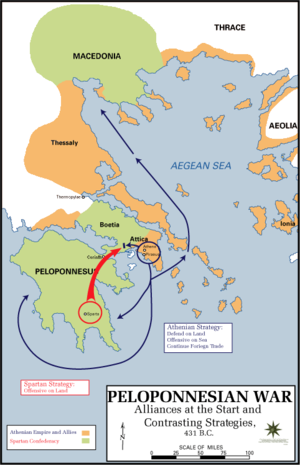The history of Greece has three period :
A Archaic Age (776-499 BC )
It started with the foundation of the Olympic Games (776 BC). During this period the poleis (city-states) were created (more than 200)
-
Each polis had its own independent government and economy.
-
Laws were different in every city-state.
-
There were armies in every single polis.
-
The polis occupied the city and the surrounding lands (demos) with pastures, forests, and farming land. During this period the Greek poleis spread out the banks of the Mediterranean Sea and the Black Sea founding colonies in order to trade with the population of the coastal areas.
Many Greeks had to leave Greece and they founded colonies throughout the Mediterranean Sea and the Black Sea from 770 BC due to several reasons:
-
Population grew a lot during the 8th and the 7th centuries.
-
It was impossible to feed everybody.
-
People had to emigrate to find new fertile lands.
These colonies were completely independent from their cities of origin (metropolis) and favoured trade with indigenous population.
Homer wrote the famous epic poems , the Iliad and the Odyssey , which tell of the deeds of Achilles and the Trojan War and Odysseus adventures in order to come back to Itaca , his home.

Classical Age (499-338 BC)
Poleis strengthened their power in Greece.
Athens and Sparta were the most important poleis in Greece during this historical stage.
Athens: Athens is the best known example of Democratic Polis. Political reforms introduced from the vile century BC. By some legislators, as Solon, they laid the foundations of the institutions of Athenian democracy. The Government of the polis was carried out through the following institutions:
-
The Assembly or Ekklesia. It was the main political decision-making body. It dealt with all the issues affecting public life: The Laws were voted, war and Peace were decided, and the rulers were elected. The Ekklesia was formed by all the Athenian citizens over twenty years.
-
The Bule or Council of the Five Hundred. He was in charge of preparing the issues that were discussed in the assembly.
-
The magistrates. They were the officials who were executing the decisions of the Assembly. Among them were the ten Strategists, who led the army and the Navy, and the nine Archons, who presided the courts and took care of the religious rites. Other judges dealt with police, transport, prisons, markets, etc.
-
Other institutions were the courts of justice
Sparta It is an example of aristocratic polis. The Spartans spent much of their time preparing for the war, while other peoples who had conquered were in charge of the work. The system of Government of Sparta was the oligarchy, which means "government of a few people." This system of Government was based on the following institutions:
-
Two kings. They belonged to different families and exerted military and religious power
-
The Gerousia or Council of Elders. It was formed by the elders of the most prestigious families and by the two kings. He proposed and elaborated the laws and could judge the Kings.
-
The Ephors. Were five magistrates with full powers to execute the decisions of the Gerousia.
-
The Assembly or Apella formed by the citizen older than 30 years old and had few functions .
Major wars took place during the Classical Age:
Persian Wars ( 499-479 BC) Persian king, Darius I wanted to conquerer Greece but his army was defeated by the Athenian army in the battle Marathon Ten years after a new Persian king , Xerxes I, wanted to revenge his father and promoted the second invasion of Greece . Xerxes was stopped by the Spartan king in the Thermopylae until his defeat . The Persian army blighted Greece until his final defeat by the Greek army in the battles of Salamis and Plateau
Peloponnesian War. This war was a fighting against Sparta and Athens . The war spread out over the whole Greece and eventually Athens was defeated by Spartan army.

Retroalimentación
Falso
The Strategist controlled the army in Athens
Retroalimentación
Verdadero
Retroalimentación
Falso
The Ekklesia was formed by all the Athenian citizens over twenty years
Retroalimentación
Verdadero
Retroalimentación
Verdadero
Retroalimentación
Falso
Apella was formed by the citizen older than 30 years old and had a few functions in Sparta

